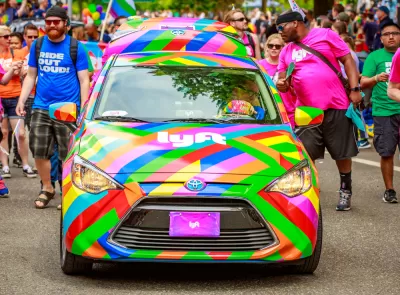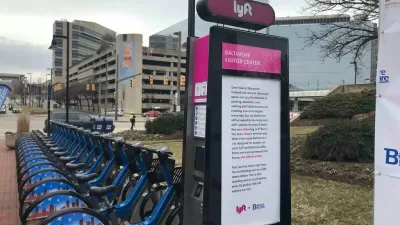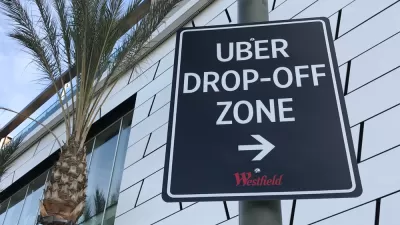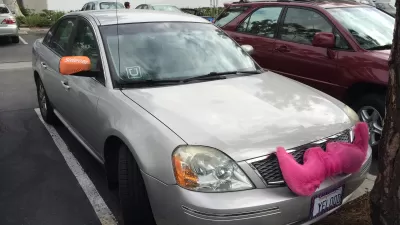A new study finds evidence that ride-hailing trips are at least as efficient, and often more efficient, than private, personal automobile trips.

The Rocky Mountain Institute (RMI) has released a new study that measures the "VMT Efficiency" of the transportation network company (TNC) Lyft. The results of the study counters an emerging body of evidence finding that TNCs add to automobile congestion and steal transit riders.
"Because they carry multiple passengers, ride-hailed cars contribute fewer miles per person to traffic than personal cars making equivalent trips," writes Carolyn Said to summarize the key finding of the study. The Rocky Mountain Institute used data provided by Lyft from the company's three largest U.S. markets (San Francisco, Chicago, and New York) to calculate the effect of TNCs for vehicle miles traveled (VMT). According to an article explaining the study on the RMI's website, the VMT Efficiency metric "is the ratio of the mileage a trip would take a person to drive to his or her destination using a personally owned vehicle (including distance traveled to find parking) to the total mileage it takes the TNC to drive a person to the same destination."
Said notes that the study did not "look at the critical question of how Lyft passengers would have gotten to their destination in the absence of ride-hailing — whether they would have walked, biked, taken public transit or driven," though RMI promises further study to tackle that question. Previous studies, most recently a prominent study by researchers at the University of California, Davis, have found that TNCs are most likely adding to congestion in cities by stealing riders away from public transit.
FULL STORY: Lyft trips in San Francisco more efficient than personal cars, study finds

Maui's Vacation Rental Debate Turns Ugly
Verbal attacks, misinformation campaigns and fistfights plague a high-stakes debate to convert thousands of vacation rentals into long-term housing.

Planetizen Federal Action Tracker
A weekly monitor of how Trump’s orders and actions are impacting planners and planning in America.

In Urban Planning, AI Prompting Could be the New Design Thinking
Creativity has long been key to great urban design. What if we see AI as our new creative partner?

King County Supportive Housing Program Offers Hope for Unhoused Residents
The county is taking a ‘Housing First’ approach that prioritizes getting people into housing, then offering wraparound supportive services.

Researchers Use AI to Get Clearer Picture of US Housing
Analysts are using artificial intelligence to supercharge their research by allowing them to comb through data faster. Though these AI tools can be error prone, they save time and housing researchers are optimistic about the future.

Making Shared Micromobility More Inclusive
Cities and shared mobility system operators can do more to include people with disabilities in planning and operations, per a new report.
Urban Design for Planners 1: Software Tools
This six-course series explores essential urban design concepts using open source software and equips planners with the tools they need to participate fully in the urban design process.
Planning for Universal Design
Learn the tools for implementing Universal Design in planning regulations.
planning NEXT
Appalachian Highlands Housing Partners
Mpact (founded as Rail~Volution)
City of Camden Redevelopment Agency
City of Astoria
City of Portland
City of Laramie





























